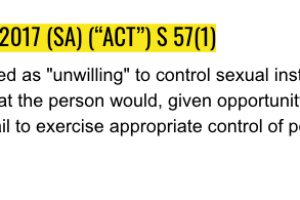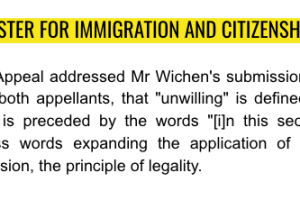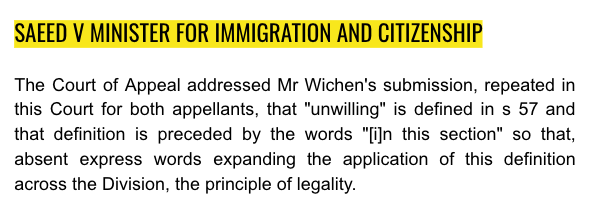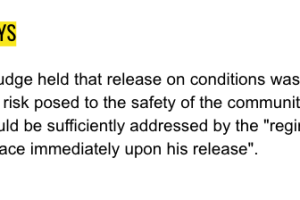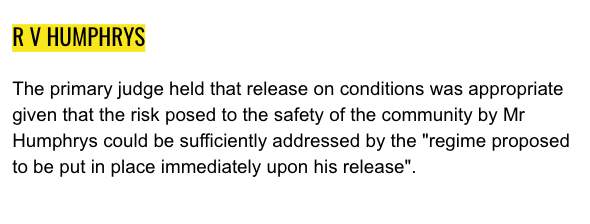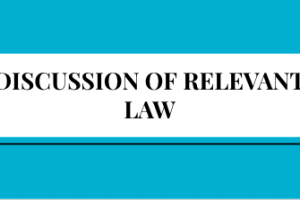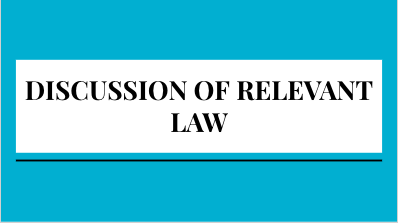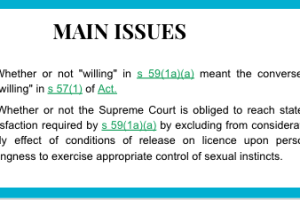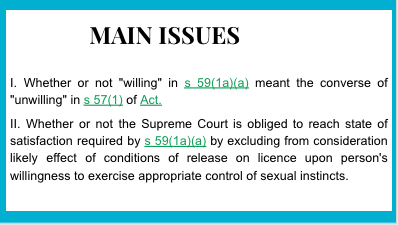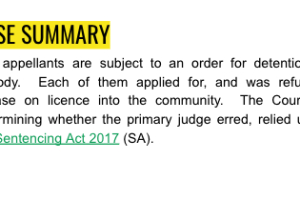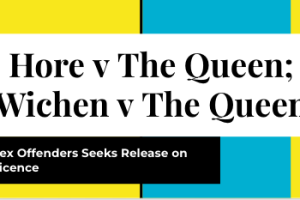Sex Offenders Seeks Release on Licence

Hore v The Queen ; Wichen v The Queen [2022] HCA 22 (15 June 2022)
The appellants are subject to an order for detention in custody. Each of them applied for, and was refused, release on licence into the community. The Court, in determining whether the primary judge erred, relied upon the Sentencing Act 2017 (SA).


Facts:
On 5 February 2003, Mr Wichen pleaded guilty to one count of serious criminal trespass in a place of residence and one count of assault with intent to rape. On 26 July 2005, he was sentenced to ten years' imprisonment, which was backdated to commence on 29 April 2002, the date he was first taken into custody. At the time of sentencing, the Director of Public Prosecutions ("the DPP") applied, pursuant to s 23 of the Repealed Act, for a declaration that Mr Wichen was incapable of controlling his sexual instincts, and for an order for his indefinite detention. Gray J, adjourned that application until the Court could receive further information about the steps taken to address the mental condition of Mr Wichen while in custody.
The adjourned application was heard on 30 August 2011. Having received further evidence, including from two psychiatrists and one psychologist, the sentencing judge declared that Mr Wichen was incapable of controlling his sexual instincts and directed that he be detained in custody until further order from the expiry of his sentence on 29 April 2012. On 24 February 2015, Mr Hore pleaded guilty in the Magistrates Court of South Australia to three counts of failing, as a registrable offender, to comply with reporting conditions without reasonable excuse and one count of possessing child pornography knowing of its pornographic nature. Mr Hore was sentenced in the Supreme Court, following a prosecution appeal against his original sentence, to 16 months' imprisonment with a non‑parole period of ten months.
On 9 February 2016, shortly before the expiry of Mr Hore's non‑parole period, the sentencing judge, Nicholson J, made an order pursuant to s 23(4) of the Repealed Act that Mr Hore be detained in custody until further order, with such detention commencing upon the expiry of his term of imprisonment. Each appellant, who are subject to an order for detention in custody under s 23 of the Criminal Law (Sentencing) Act 1988 (SA) ("the Repealed Act"), applied for, and was refused, release on licence into the community pursuant to s 59 in the current regime. The primary judge held that, on the proper construction of s 59(1a)(a), "willing" means the converse of "unwilling" as defined in s 57(1). On that basis, in each case, the primary judge was not satisfied that the relevant appellants was "willing" to control his sexual instincts.

Issues:
I. Whether or not "willing" in s 59(1a)(a) meant the converse of "unwilling" in s 57(1) of Act.

Applicable law:
Sentencing Act 2017 (SA) ("Act") s 57 - conferred upon Supreme Court of South Australia discretion to order that persons convicted of certain sexual offences be detained in custody until further order.
Sentencing Act 2017 (SA) ("Act") s 59(1a)(a) - provided that person detained in custody could not be released on licence unless person satisfied Supreme Court that person capable of controlling and willing to control sexual instincts.
Sentencing Act 2017 (SA) ("Act") s 57(1) - provided that, in that section, a person is regarded as "unwilling" to control sexual instincts if there is a significant risk that the person would, given opportunity to commit relevant offence, fail to exercise appropriate control of person's sexual instincts.

Child Sex Offenders Registration Act 2006 (SA) s 44(1) - pursuant to which Mr Hore pleaded guilty in the Magistrates Court of South Australia to three counts of failing, as a registrable offender, to comply with reporting conditions without reasonable excuse.
Criminal Law Consolidation Act 1935 (SA) s 63A - prohibits possessing child pornography knowing of its pornographic nature.
Hore v The Queen (2020) 285 A Crim R 94 -held that, on the proper construction of s 59(1a)(a), "willing" means the converse of "unwilling" as defined in s 57(1).
R v Wichen [2005] SASC 323; (2005) 92 SASR 528 - provided that Mr Wichen had a significant history of criminal offending, which commenced when he was 12 years old and included convictions for two attempted rapes and indecent assault.
Police v Hore [2015] SASC 150 - where Mr Hore was sentenced in the Supreme Court, following a prosecution appeal against his original sentence, to 16 months' imprisonment with a non‑parole period of ten months.
Wichen v The Queen [2020] SASC 157 - where each appellant applied to the Supreme Court for release on licence pursuant to s 24(1) of the Repealed Act.
Saeed v Minister for Immigration and Citizenship [2010] HCA 23 - where the Court of Appeal addressed Mr Wichen's submission, repeated in this Court for both appellants, that "unwilling" is defined in s 57 and that definition is preceded by the words "[i]n this section" so that, absent express words expanding the application of this definition across the Division, the principle of legality.

North Australian Aboriginal Justice Agency Ltd v Northern Territory [2015] HCA 41 - where his Honour declared that Mr Hore was incapable of controlling his sexual instincts.
R v Humphrys [2018] SASC 39 - where the primary judge held that release on conditions was appropriate given that the risk posed to the safety of the community by Mr Humphrys could be sufficiently addressed by the "regime proposed to be put in place immediately upon his release".

Analysis:
It is not correct to say that "unwilling" is defined in s 57(1). It is more accurate to say that s 57(1) deems a person to whom s 57 applies to be "unwilling" to exercise appropriate control of the person's sexual instincts in circumstances where the risk of a failure to exercise appropriate control is "significant". A person seeking discharge under s 58 or release on licence under s 59 is, and can only be, a person to whom s 57 applies. The focus of the medical reports required by each of ss 57(6), 58(2) and 59(2) is upon whether the person is either incapable of controlling the person's sexual instincts, or (to interpolate the deemed meaning of "unwilling") at significant risk of failing to control those instincts if given the opportunity to commit a relevant offence.
In s 57(1), the particular use of the expression "unwilling" recognises that a person's willingness to control his or her sexual instincts may fall somewhere on a spectrum of states of volition, at some point on which the community is at "significant risk" of harm for reasons other than a want of capability on behalf of the person to control his or her sexual instincts. When s 59(1a)(a) speaks of positive satisfaction that the person is willing to control his or her sexual instincts, it is speaking of an affirmative conclusion that the person falls within that part of the spectrum of states of volition which would not pose a significant risk of harm to the community should the person's commitment to appropriate self‑control be tested after release from detention. In this context, the term "significant risk" serves to establish the level of risk by reference to which the regime is engaged in s 57 or relaxed under s 58 or s 59.
Conclusion:
The Appeal is allowed. The Court sets aside the order of the Court of Appeal of the Supreme Court of South Australia made on 7 May 2021 and, in its place, order that: (a) the appeal to that Court be allowed; (b) the decision of the primary judge be set aside; and (c) the appellant's application for release on licence be remitted to the primary judge to be determined according to law. There would be no point in requiring the Supreme Court to obtain and act upon the reports of medical practitioners if those reports were not directed to the task required of the Court by ss 58(1a) and 59(1a).

